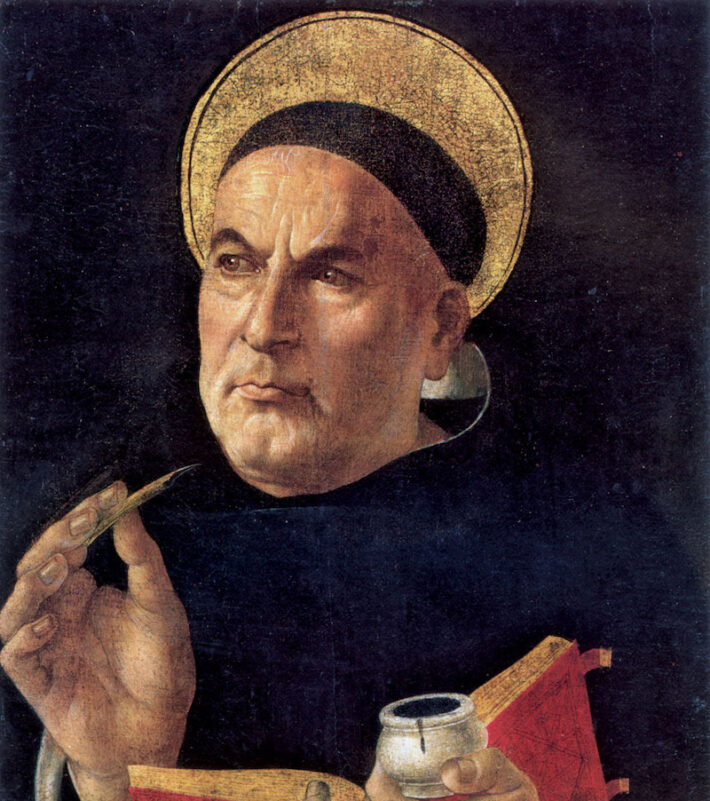Christian Art | Saint Thomas Aquinas
On Why We Desire To Know God
‘To one who has faith, no explanation is necessary. To one without faith, no explanation is possible.’
Saint Thomas Aquinas, born in Roccasecca, Italy, in 1225, was a Dominican friar, philosopher, and theologian whose works continue to have a profound impact on theology and philosophy to this day. Saint Thomas Aquinas received his early education at the Abbey of Monte Cassino, where he studied the classics, logic, and rhetoric, and later studied theology and philosophy in Paris, where he became a pupil of Albertus Magnus.
Saint Thomas Aquinas’ contributions to theology and philosophy were substantial, and he is regarded as one of the most important figures in the history of Western thought. He is best known for his masterpiece, the Summa Theologiae, a comprehensive and systematic treatise on theology that covers topics ranging from the existence and nature of God to the nature of human beings and the moral life. The Summa Theologiae is regarded as one of the most important works of Christian theology.
Saint Thomas Aquinas’ philosophy was grounded in Aristotelianism, but he was also heavily influenced by the works of Augustine. He sought to reconcile the insights of reason with the truths of revelation, arguing that faith and reason are complementary rather than contradictory. He developed a philosophical method that emphasized the importance of using reason to understand the natural world and the nature of God, while also acknowledging the limits of reason and the necessity of faith.
Saint Thomas Aquinas’ influence on theology and philosophy has been significant. He is credited with reviving the study of philosophy in the West, and his ideas had a profound impact on medieval thought.
The Summa Theologiae is Saint Thomas Aquinas’ most famous and influential work. It is a monumental achievement, covering a wide range of theological and philosophical topics with remarkable depth and clarity. The Summa Theologiae is organized around a series of questions, each of which is treated in a methodical and rigorous manner. The work is marked by Saint Thomas Aquinas’ clarity of thought and his ability to integrate philosophical insights with Christian doctrine.
Life And Works Of Saint Thomas Aquinas
‘The greatest kindness one can render to any man consists in leading him from error to truth.’
Saint Thomas Aquinas was born in Roccasecca, Italy, in 1225, to a noble family. He was educated at the Benedictine monastery at Monte Cassino and then studied at the University of Naples, where he was exposed to the works of Aristotle and other classical authors. In 1244, he joined the Dominican Order against his family’s wishes and continued his studies in Paris, where he became a pupil of Albertus Magnus.
Saint Thomas Aquinas wrote extensively throughout his life, producing works that covered a wide range of theological and philosophical topics. His most famous work, the Summa Theologiae, was written between 1265 and 1274 and is considered his masterpiece. It is a comprehensive and systematic treatise on Christian theology that covers topics such as the nature of God, creation, angels, and the nature of human beings. The Summa Theologiae is organized around a series of questions and is written in a clear and concise style that makes it accessible to readers of all levels of education.
Also, Saint Thomas Aquinas wrote the Summa Contra Gentiles, which was written between 1259 and 1264. This work is addressed to non-Christians and is designed to provide arguments for the truth of the Christian faith. It covers topics such as the existence of God, creation, and the immortality of the soul. The Summa Contra Gentiles is notable for its use of philosophical arguments to support Christian doctrine.
In addition to his major works, Saint Thomas Aquinas wrote commentaries on the works of Aristotle, which were instrumental in bringing Aristotelian philosophy into the Christian tradition. His commentaries on Aristotle’s works, such as the Metaphysics and the Nicomachean Ethics, were widely read and influential, and helped to establish the study of philosophy as a legitimate and important field of study in the Christian tradition.
Saint Thomas Aquinas’ theological and philosophical influences were wide-ranging. He was heavily influenced by the works of Aristotle, which he saw as providing a framework for understanding the natural world and the nature of God. He was also influenced by the works of Saint Augustine, which provided him with a deep appreciation for the importance of faith and the need to reconcile reason and revelation.
Summa Theologiae
‘The study of truth requires a considerable effort – which is why few are willing to undertake it out of love for knowledge – despite the fact that God has implanted the desire for it in everyone.’
The Summa Theologiae is the most famous and influential work of Saint Thomas Aquinas. Comprised of over 3,500 articles and written over the course of a decade, the Summa Theologiae is a systematic and comprehensive exploration of theology and philosophy.
Structure of the Summa Theologiae:
‘All that is true, by whomsoever it has been said, is from the Holy Spirit.’
The Summa Theologiae is divided into three main parts: Part I (Prima Pars), Part II (Secunda Pars), and Part III (Tertia Pars). Each part is further divided into several treatises, each of which is devoted to a specific topic.
Part I (Prima Pars) is concerned with God and the universe. It is divided into six treatises, each of which explores a different aspect of theology and philosophy, including God’s existence, the nature of God, creation, and the nature of man.
Part II (Secunda Pars) is concerned with ethics. It is divided into two parts, the first of which deals with the natural law and the second of which deals with divine law. This section explores a range of ethical topics, including the virtues, sin, and the nature of justice.
Part III (Tertia Pars) is concerned with Christ and the sacraments. It is divided into three treatises, each of which deals with a different aspect of Christology and sacramental theology, including the incarnation, the sacraments, and the resurrection.
Content and Themes of the Summa Theologiae:
‘The things we love are many, and differ according to the difference of the nature of the individuals who love them.’
The Summa Theologiae covers a wide range of theological and philosophical topics, including metaphysics, ethics, Christology, and sacramental theology. The following themes run throughout the work:
- God and the Universe:
At the heart of the Summa Theologiae is Saint Thomas Aquinas’ exploration of the relationship between God and the universe. He argues that God is the ultimate cause and explanation of all things, and that the universe was created by God out of nothing.
- Human Nature:
Saint Thomas Aquinas also explores the nature of human beings, arguing that humans are rational creatures who are made in the image of God. He also discusses the nature of human knowledge, arguing that human beings are capable of knowing the world around them through both reason and revelation.
- Ethics:
Saint Thomas Aquinas argues that the ultimate goal of human life is to achieve happiness, which he defines as the perfect fulfilment of human nature. He also explores the nature of virtue, sin, and the nature of justice.
- Christology and Sacramental Theology:
The Summa Theologiae also explores Christology and sacramental theology. Saint Thomas Aquinas argues that Christ is both fully human and fully divine, and that he came to earth to redeem humanity from sin. He also explores the nature of the sacraments, arguing that they are necessary for salvation.
Summa Theologiae: Content and Significance
‘Love takes up where knowledge leaves off.’
As above, the work is divided into three parts, with each part consisting of a number of questions. Each question is then further divided into articles, and each article concludes with a series of objections and replies. This structure allows Saint Thomas Aquinas to present his arguments in a systematic and organized way.
The first part of the Summa Theologiae deals with God, focusing on questions such as the existence and nature of God, the attributes of God, and the Trinity. Saint Thomas Aquinas argues that while faith is necessary for salvation, reason can help us understand the nature of God and the world around us. He believes that reason and faith are complementary, rather than in conflict with each other.
The second part of the Summa Theologiae deals with ethics, focusing on questions such as the nature of moral goodness, the relationship between law and morality, and the virtues. In this part of the Summa, Saint Thomas Aquinas develops his theory of natural law, which holds that certain actions are inherently good or bad, regardless of the particular circumstances. He also argues that the virtues, such as prudence, justice, fortitude, and temperance, are essential for living a moral life.
The third part of the Summa Theologiae deals with Christ and the sacraments, focusing on questions such as the nature of Christ, the Eucharist, and the other sacraments. In this part of the Summa, Saint Thomas Aquinas explores the nature of Christ’s divinity and humanity, and the relationship between the two. He also discusses the importance of the sacraments in the life of a Christian, particularly the Eucharist, which he believes is the source and summit of the Christian life
Saint Thomas Aquinas’ Philosophical Method
‘Better to illuminate than merely to shine, to deliver to others contemplated truths than merely to contemplate.’
Saint Thomas Aquinas’ philosophical method is grounded in a use of reason and revelation. He believed that reason and revelation are complementary sources of knowledge, and that they can be used together to gain a deeper understanding of the nature of reality.
Saint Thomas Aquinas’ philosophical method involves an analysis of concepts and arguments, as well as a consideration of empirical evidence. He believed that philosophical inquiry should be guided by reason, and that reason should be used to evaluate the claims of revelation. In this way, he sought to bring together the insights of philosophy and theology in a coherent and integrated way.
Saint Thomas Aquinas believed that philosophy could help to clarify and refine the concepts used in theological discourse. He argued that philosophy could provide a deeper understanding of the nature of reality, and that it could help to resolve apparent conflicts between reason and revelation.
Saint Thomas Aquinas believed that faith and reason are both necessary for a complete understanding of the nature of reality, and that they are mutually supportive. He argued that faith provides us with knowledge of the divine, while reason provides us with knowledge of the natural world. By bringing these two sources of knowledge together, he sought to create a comprehensive and integrated worldview that would be consistent with both reason and revelation.
Saint Thomas Aquinas also believed that philosophy could help to clarify and refine theological concepts. He argued that philosophical inquiry could help to distinguish between different aspects of theological discourse, such as the nature of God, the nature of creation, and the nature of human beings. By providing a clear and systematic analysis of these concepts, he believed that philosophy could help to deepen our understanding of the nature of reality.
Theology And Human Nature
‘The things that we ought to fear are those which, in fact, are in our power to prevent or remedy.’
Saint Thomas Aquinas’ understanding of creation is closely linked to his understanding of God. He believed that God created the world ex nihilo (out of nothing), and that all created things are fundamentally dependent on God for their existence and continued being. He also emphasized the goodness of creation, and argued that the natural world reflects God’s wisdom and goodness.
In his writings on human nature, Saint Thomas Aquinas emphasized the importance of reason and free will. He believed that human beings are created in the image of God, and that they are capable of knowing and loving God through the use of reason. He also believed that human beings have the capacity to choose freely between good and evil, and that their moral choices have eternal consequences.
Saint Thomas Aquinas’ ethics are based on his understanding of human nature and the nature of the good. He argued that the highest good is the love of God, and that all other goods are subordinate to this ultimate end. He also developed a moral theory based on natural law, which emphasizes the objective order of creation and the importance of fulfilling one’s natural capacities and responsibilities.
In his writings on salvation, Saint Thomas Aquinas emphasized the importance of grace and the sacraments. He believed that human beings cannot achieve salvation on their own, but that they require the assistance of God’s grace. He also emphasized the importance of the Church and the sacraments as means of receiving God’s grace and participating in the life of Christ.
Saint Thomas Aquinas’ Ethics
‘The highest manifestation of life consists in this: that a being governs its own actions. A thing which is always subject to the direction of another is somewhat of a dead thing.’
Aquinas argues that the human person is made for a specific end or goal, which he calls the ‘beatific vision’ or the vision of God. This ultimate end is reflected in the natural law, which is written on the human heart and discernible by reason. Natural law is the principle that directs human beings towards their ultimate end, and it is the standard by which all human actions should be judged.
In terms of practical ethics, Aquinas’s understanding of natural law leads him to a virtue-based ethical system. According to Aquinas, virtues are dispositions that help individuals to live in accordance with the natural law and move towards their ultimate end. Virtues are habits that incline individuals towards the good, and they are developed through repeated actions that reflect the natural law.
Aquinas identifies four cardinal virtues – prudence, justice, fortitude, and temperance – that are necessary for any individual to live a good life. These virtues are then supplemented by the theological virtues of faith, hope, and charity, which enable individuals to participate in the divine life and ultimately attain the beatific vision.
Aquinas’ ethical ideas have been the subject of criticism. Some contemporary ethicists have argued that his emphasis on natural law is overly rigid and fails to take into account the diversity of human experience. Others have criticized his focus on virtues, arguing that virtues may be culturally specific and that a universal set of virtues may not be applicable in all contexts.
Saint Thomas Aquinas And The Church
‘The things that we love tell us what we are.’
Saint Thomas Aquinas’ ideas have had a lasting impact on the Church’s understanding of the sacraments and the liturgy. He emphasized the importance of the Eucharist and the sacraments as means of receiving God’s grace and participating in the life of Christ. He also wrote extensively on the nature of the Church and the importance of ecclesiology, helping to establish a framework for understanding the Church’s role in salvation history.
In the centuries following Saint Thomas Aquinas’ death, his ideas were further developed and refined. The Thomistic tradition, as it came to be known, continues to be an influential part of Catholic thought. Many theologians and philosophers continue to draw on Saint Thomas Aquinas’ ideas as a framework for understanding the relationship between faith and reason, and for developing a comprehensive and systematic approach to theology and philosophy.
Legacy Of Saint Thomas Aquinas
‘The things we love are many, and differ according to the difference of the nature of the individuals who love them.’
In philosophy, Saint Thomas Aquinas’ ideas have been particularly influential in the areas of metaphysics and ethics. His understanding of God as the first cause and the prime mover has been a key concept in Western philosophy since the Middle Ages, and his arguments for the existence of God continue to be debated and refined by philosophers today. His emphasis on natural law and the importance of human nature in ethical decision-making has also been a significant contribution to the development of ethical theory.
In theology, Saint Thomas Aquinas’ understanding of the relationship between faith and reason has been a key concept in Catholic theology since the thirteenth century, and his work on the nature of God, creation, and human nature has helped to shape the development of Catholic doctrine. His emphasis on the importance of tradition and the authority of the Church has also had a lasting impact on the way that Catholics think about their faith.
Saint Thomas Aquinas’ ideas have been important for contemporary philosophical and theological debates. His emphasis on reason and natural law has been relevant in discussions about bioethics, environmental ethics, and social justice. His ideas about the relationship between faith and reason have also been influential in discussions about religious pluralism and interfaith dialogue.








